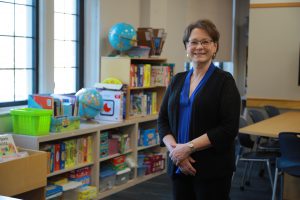Archive for October, 2020
Ohio Native to Share Journey From Political Science Major to Broadway’s ‘Hamilton’
Tuesday, October 13th, 2020Broadway performances are shut down for the rest of the year, but the associate and supervising director of the hit musical “Hamilton” isn’t throwing away his shot to inspire students at The University of Toledo.
Patrick Vassel, a native of Akron, Ohio, who majored in political science in college and also earned a master’s degree in teaching, is the first person to be featured in a new virtual series offered by the UToledo College of Arts and Letters titled “Tell Me Your Story: Liberal Arts Careers.”
Dr. Melissa Gregory, associate dean for undergraduate education and curriculum and professor of English, will interview Vassel from 7 to 8 p.m. Tuesday, Oct. 20. The free, public event can be accessed on Zoom using the access code 870 2931 5293. The meeting password is 939421.

Patrick Vassel, associate and supervising director of the hit musical “Hamilton”
Vassel will talk about his journey from studying political science at the University of Notre Dame to teaching middle school students in New York and eventually pivoting to opportunities in musical theater.
“We want to show our students how liberal arts degrees can be the foundation of dynamic and fascinating careers,” Gregory said. “I’m excited to have a conversation with Patrick because he’s a fantastic example of someone who leveraged all of his liberal arts training to make it to Broadway. The skills that he learned as a liberal arts major helped him figure out when and how to change his path.”
After graduating with a political science degree in 2007, Vassel interned for then-U.S. Rep. Sherrod Brown, taught special education for Teach for America and worked as a freelance theater director.
He made his Broadway debut in 2012 as the assistant director of “Magic/Bird,” a play about Larry Bird and Magic Johnson.
 Vassel joined “Hamilton” for an initial staging workshop prior to rehearsals for The Public Theater run in 2014. Since then, Patrick has been involved in all “Hamilton” companies except London.
Vassel joined “Hamilton” for an initial staging workshop prior to rehearsals for The Public Theater run in 2014. Since then, Patrick has been involved in all “Hamilton” companies except London.
His role as associate and supervising director includes casting, hiring and supporting resident directors, and regular communication, collaboration and travel to each of the five North American companies. He is currently finalizing the Australian cast, and in the midst of virtual casting for the German-language production of “Hamilton.”
During the UToledo event, Vassel will discuss plans for “Hamilton” productions overseas in Australia and Germany in 2021.
“I’m excited to connect with the campus community in this unprecedented year to share what I can about what I know and what was helpful for me when I was a college student in the Midwest and trying to figure out what to do next,” Vassel said. “If 2020 has taught us nothing else, it’s that we all need one another and all need to offer whatever we can to help those around us. I’m honored and grateful to have this time with The University of Toledo campus community and hope I can shine some light in a time of uncertainty.”
Gregory said the goal of the new “Tell Me Your Story” conversations is to highlight the value of pursuing a degree in the humanities, social sciences and the arts.
“Liberal arts degrees lead to great careers because those majors provide critical skills that make you capable of reflecting on what you want, seizing opportunity and adapting to new situations,” Gregory said. “In Patrick’s case, he has a lot of different interests and explored several different paths with his education and his post-college life. He ended up becoming an important part of a musical that has made an indelible mark on American theater and continues to expand its influence around the world. We’re lucky to have someone talk to us about what it was like to work on such an important theatrical event.”
UToledo Awarded $1.1 Million Federal Grant to Advance Clean Water Technology
Tuesday, October 6th, 2020Searching for new ways to address the growing threat to drinking water in northwest Ohio and across the globe, Dr. Jason Huntley discovered that native freshwater bacteria can destroy toxins produced during harmful algal blooms.
The University of Toledo scientist has now received a $1.1 million grant from the National Oceanic and Atmospheric Administration to advance that research into real-world solutions.
Huntley, an associate professor in the UToledo Department of Medical Microbiology and Immunology, has already shown in lab experiments that biofilters using those Lake Erie bacteria can remove microcystin at levels exponentially above current exposure guidelines established by the World Health Organization.
“This grant will enable us to extend our research to the next level,” Huntley said. “We did this successfully in the lab. Now we want to scale it up and put the bacteria to work in the water treatment plant.”

Huntley
The three-year research project will take a multifaceted approach to translate Huntley’s earlier finding into technologies that safeguard the drinking water of hundreds of thousands of people.
“One of our big pushes here at UToledo is to not just do science for science’s sake, but to ask questions about how it can improve human health,” Huntley said. “This isn’t just a Toledo problem. There are harmful algal blooms all across the country and all across the world. This is a solution to a global health problem.”
Water treatment plants primarily use activated carbon to capture the microcystin toxins released during some harmful algal blooms. While effective, there are drawbacks. It can be expensive, there’s a limit to how much toxin can be removed from the water and the process generates microcystin-laden waste products that have to be dealt with.
Huntley and his research team believe their bacteria could help address those issues. Biofilters could be used to treat drinking water before it reaches the tap, and the bacteria could be added to the treatment plant byproducts to degrade the lingering toxins.
It’s also an inexpensive solution.
“It’s not free, but it’s really cheap to grow these bacteria that chew up and degrade the toxins. We grow them in water, that’s it. We think we can use them to treat water coming into the treatment plant as well as eliminating toxins in the water treatment byproducts, eliminating the need to incinerate these waste products or send them to a landfill,” Huntley said.
Prior to large-scale testing at the Toledo wastewater treatment plant, researchers will work to further develop and test the biofilters in a range of conditions, such as different water pressures and temperatures.
The research team also will work to isolate and identify the bacterial enzymes that break down microcystin, with a goal of being able to produce them on an industrial scale. Some of that work will be done in collaboration with the Lawrence Livermore National Laboratory — a connection that was made during 2019’s National Lab Day at UToledo. The long-term goal is to develop water treatment tablets or droplet bottles that could be used to quickly detoxify water while boating, at family cabins or while hiking.
Huntley’s early work on this issue was funded by the Ohio Department of Higher Education’s Harmful Algal Bloom Research Initiative and the Ohio Sea Grant. The success of that research helped UToledo earn the NOAA grant.
“This is turning taxpayer money here in Ohio to federally funded grants that bring big money back to Ohio,” Huntley said.
U.S. Department of Defense Awards UToledo $3 Million to Promote STEM Education in Early Childhood to Military-Connected Families
Monday, October 5th, 2020NURTURES, an innovative early childhood STEM education program led by The University of Toledo that has shown success in classrooms and homes across the region, is going national.
The U.S. Department of Defense awarded UToledo a three-year, $3 million grant to offer the program to military-connected families across the country with partners including Georgia State University and Washington School Research Associates.
UToledo’s project is one of 12 selected out of 185 applicants in the U.S. to be awarded a total of $31 million through the National Defense Education Program.
“The Department of Defense is proud to support the STEM workforce our Nation needs to maintain our technological superiority far into the future,” said Michael Kratsios, acting under secretary of defense for research and engineering. “We are particularly pleased with the range of initiatives pursued by this year’s awardees, with programs for early childhood education, post-secondary study and outreach to student veterans. This investment will be critical to expanding STEM opportunities to students, educators and veterans in underserved, underrepresented and military-connected communities.”
NURTURES improves pre-K-through-third-grade STEM education, which includes science, technology, engineering and math, through teacher professional development, family engagement and community outreach. These efforts to enhance teaching and learning early in a child’s life have resulted in greater student interest and achievement in STEM in the program’s nine years in northwest Ohio and southeast Michigan.
Data from standardized testing in Toledo Public Schools show an increase in reading, early literacy and math scores in students of teachers who have participated in NURTURES, with gains being sustained through 5thgrade.
According to research published in the Journal of Research in Science Teaching, every year that a student has a NURTURES program teacher adds on average 8.6 points to a student’s early literacy standardized test score compared to control students, 17 points to a student’s mathematics score and 41.4 points to a student’s reading score.
The program through the Department of Defense will be transitioned from a face-to-face format to a virtual format, while also mailing family science take-home packs and community event materials directly to schools for home and community use.

Dr. Charlene Czerniak, professor emeritus of science education and research professor in the UToledo College of Engineering
“We are proud to scale up nearly a decade of work that our UToledo team started here in the Toledo area,” said Dr. Charlene Czerniak, professor emeritus of science education and research professor in the UToledo College of Engineering, who is leading the project. “NURTURES has helped more than 5,000 students and 330 teachers across northwest Ohio and southeast Michigan. I believe it is a great fit for military families. They move so often, it is critical to invest in opportunities to engage families and focus on family and community.”
A hallmark of the NURTURES program is that it goes beyond professional development and coaching for early childhood education teachers to better teach science to their young students. By also educating parents how to support their child’s STEM learning at home and through events in the community, NURTURES provides a lasting mechanism to support STEM learning across a child’s lifetime.
The Department of Defense award allows NURTURES to be offered to 135 teachers, 2,700 underserved and underrepresented pre-K-through-3rdgrade students, and 10,800 military-connected family members throughout the United States.
In the first year, professional development for early childhood teachers will be delivered on-site to Purple Star schools in Ohio and schools linked to Fort Benning in Georgia and Joint Base Lewis-McChord in Washington.
In the second year, NURTURES will be transitioned to an online format. It will be offered fully online by the third year and expanded across the country to military bases, the Military Interstate Children’s Compact Commission, military-connected schools and Purple Star schools in Georgia, Alabama, Washington, Florida, Virginia, Massachusetts and New Mexico with all branches of the military represented.
Twelve states now have Purple Star-designated schools.
“The award for military family-friendly schools recognizes campuses and communities that show a major commitment to students and families connected to our nation’s military,” said Pete LuPiba, commissioner for the Military Interstate Children’s Compact Commission and veteran of Operation Iraqi Freedom, who founded the Purple Star School Award initiative four years ago to address the educational challenges of transitioning children of military families.
“We have witnessed the positive outcomes of this program on young children attending schools in our region, and the UToledo College of Engineering is fortunate to have Dr. Charlene Czerniak continue her leadership of this project as it expands from a regional to a national level,” Dr. Mike Toole, dean of the UToledo College of Engineering, said. “As a military veteran, I also am pleased that the NURTURES program will be able to make a positive impact on military families and their children.”
Dr. Scott Molitor, professor of bioengineering and senior associate dean of academic affairs in the UToledo College of Engineering, is working with Czerniak to lead the national project. Several experts from the UToledo Judith Herb College of Education are also involved in the project, including Dr. Susanna Hapgood, associate professor in the Department of Teacher Education, and Dr. Joan Kaderavek, professor emerita of early childhood, physical and special education and Distinguished University Professor.
Family packets and community event materials are planned to be mailed to participants through a process using Lott Industries in Toledo, a nationally recognized and award-winning nonprofit organization that hires individuals with developmental disabilities for light packaging and assembly.
The NURTURES program was originally a five-year, $10 million program funded in 2011 by the National Science Foundation to engage teachers and parents in supporting a young child’s natural curiosity through interactive science lessons. The National Science Foundation awarded an additional $2.3 million dollars to NURTURES three years ago.
In 2017 the American Association of State Colleges and Universities honored UToledo with its Christa McAuliffe Award for Excellence in recognition of NURTURE’s success in improving student achievement.

